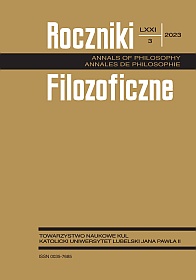JAK ‘POWINIEN’ MOŻE WYNIKAĆ Z ‘JEST’? REEWALUACJA TEZY JOHNA R. SEARLE’A
HOW ‘OUGHT’ CAN BE INFERRED FROM ‘IS’? JOHN R. SEARLE’S THESIS REVISITED
Author(s): Wacław JanikowskiSubject(s): Social Philosophy, Contemporary Philosophy, Philosophy of Mind
Published by: Towarzystwo Naukowe KUL & Katolicki Uniwersytet Lubelski Jana Pawła II
Keywords: J.R. Searle; Naturalistic Fallacy; speech acts; promise; motivation; institutional facts; normativity;
Summary/Abstract: In this article, I discuss the conception of normative sentences by John R. Searle. The conducted analysis is to prove its credibility. Also, its author in 2021, more than half a century after its first formulation, despite numerous discussions over that time, claims that he maintains the statement about the validity of this conception, and in particular also the famous thesis about the possibility of making an inferential transition from sentences about facts to sentences about duties (Searle 2021, 3–16). The creator of the commonly known theory of speech acts argues that some normative sentences result conceptually from factual (descriptive) sentences. I analyze his arguments in detail, trying to explain how to understand his thesis that talking about the so-called Naturalistic Fallacy may itself be a mistake. I focus here on the issue of implication (correct inferences) and the conditions of the truth of normative sentences. Considering the various possibilities of interpreting Searle’s thesis and arguments will also justify the claim that they are correct and retain their importance. A unique element of Searle’s conception that I argue with is his claim about the allegedly intrinsically motivating power of speech acts, such as making a promise.
Journal: Roczniki Filozoficzne
- Issue Year: 71/2023
- Issue No: 3
- Page Range: 133-154
- Page Count: 22
- Language: Polish

